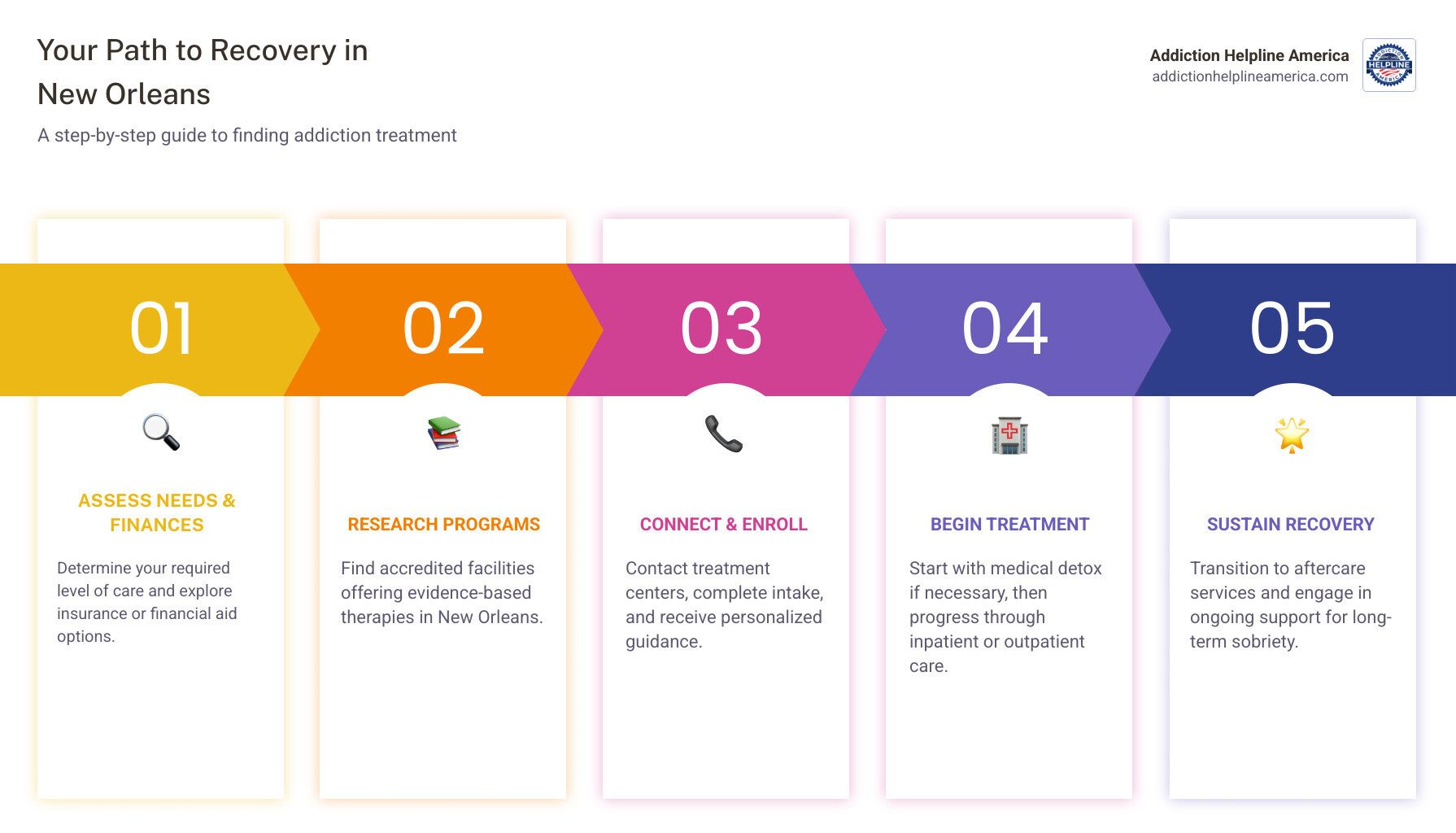
Finding Hope: Your Guide to Rehab New Orleans
Rehab new orleans offers a range of treatment options for individuals and families struggling with addiction, from medical detox and inpatient residential programs to intensive outpatient care and sober living homes. Here’s what you need to know:
Quick Guide to New Orleans Rehab Options:
- Medical Detox – Medically supervised withdrawal management (typically 3-7 days)
- Inpatient/Residential Treatment – 24/7 care in a structured environment (30-90 days average)
- Partial Hospitalization (PHP) – Day treatment while living at home or sober housing
- Intensive Outpatient (IOP) – Several sessions per week (3-6 months)
- Outpatient Programs – Weekly therapy and counseling
- Sober Living Homes – Transitional housing with peer support
- Aftercare Services – Long-term recovery support
Cost Range in New Orleans:
- Outpatient: $1,000 – $10,000
- Inpatient: $5,000 – $50,000
- Free and low-cost options available through state-funded programs
If you’re reading this, you’re likely facing one of life’s toughest challenges, either for yourself or a loved one. You’re not alone, and help is available right here in New Orleans.
The path to recovery can feel overwhelming. With dozens of treatment centers in the area, each with different programs and payment options, how do you choose? What if you can’t afford it, or you’re worried about your job?
This guide answers those questions. We’ll help you understand your options, what treatment costs, and how to access care even if money is tight.
Recovery is possible. New Orleans offers a full continuum of care, from detox to residential and outpatient services. Some facilities provide completely free residential programs for those without resources. Others offer sliding-scale fees, payment plans, or accept various insurance plans. The good news is that insurance typically covers a significant portion of addiction treatment costs, and federal law protects your job while you’re in treatment.
Addiction Helpline America has been connecting people with life-saving treatment for years. We specialize in helping you steer rehab new orleans options regardless of your financial situation. We understand the local landscape and can guide you to programs that meet your specific needs, whether that’s dual diagnosis care, gender-specific treatment, or specialized services for veterans.
Let’s walk through everything you need to know to make an informed decision and take that crucial first step.
Glossary for rehab new orleans:
Understanding the Different Types of Rehab Programs in New Orleans
Choosing the right treatment program is crucial, but it doesn’t have to be overwhelming. There’s no single “best” rehab—only the best one for you. Your journey is unique, and rehab new orleans options reflect that diversity.
Addiction treatment varies based on severity, personal circumstances, and individual needs. Some people need intensive 24/7 support, while others do better with flexible programs that fit around work and family. New Orleans offers a full spectrum of care, including medical detox, inpatient and outpatient programs, transitional housing, and long-term aftercare.
Let’s break down what each of these looks like.
Medical Detoxification: The First Step
If you’ve been using substances like alcohol, opioids, or benzodiazepines regularly, stopping suddenly can be dangerous. Medical detox provides a safe, supervised environment where healthcare professionals monitor you around the clock as your body withdraws from the substance. Medical staff can provide medications to ease withdrawal symptoms and prevent complications. This process typically lasts three to seven days.
Detox is just the beginning. It stabilizes you physically so you can begin the therapeutic work of recovery—the counseling and skill-building that form the foundation of lasting change. Addiction Helpline America can connect you with medical detox services that prioritize your safety and comfort. You can also learn more about Detox in New Orleans options.
Inpatient vs. Outpatient Care
One of the biggest decisions is choosing between inpatient and outpatient treatment.
Inpatient residential treatment means you live at the facility full-time, typically for 30 to 90 days. It’s ideal if you’re dealing with severe addiction or lack a stable, supportive home environment. The benefits include 24/7 medical and emotional support in a structured environment free from triggers. You’re immersed in intensive daily therapy, surrounded by a community of peers on the same journey.
Outpatient programs offer more flexibility. You attend therapy sessions during the day or evening and return home. This works well if you have a strong support system, responsibilities you can’t leave, or a less severe addiction. Outpatient care lets you maintain your daily routine and apply what you learn in therapy to real-world situations immediately. It’s also generally more affordable. This category includes Partial Hospitalization Programs (PHP) and Intensive Outpatient Programs (IOP), which offer different levels of intensity.
Addiction Helpline America can help you weigh these options and find a program that balances your treatment needs with your life realities.
Specialized Treatment Tracks
Addiction often co-occurs with mental health conditions like anxiety, depression, or PTSD. This is called a dual diagnosis. Approximately 50% of people with substance use disorders have dual diagnoses. Successfully treating addiction requires integrated care that addresses both conditions simultaneously. Many New Orleans facilities specialize in this type of treatment.
Beyond dual diagnosis, many rehab new orleans programs offer specialized tracks:
-
Gender-specific programs recognize that men and women often have different experiences with addiction and recovery. Single-gender environments can create safer spaces for participants to open up about sensitive issues.
-
Trauma-informed care acknowledges that unresolved trauma often fuels addiction. These programs integrate specialized therapies to heal those deep wounds.
-
Veteran programs address the unique challenges faced by those who’ve served in the military, such as combat trauma and the difficulty of transitioning to civilian life. Many facilities provide veteran-focused tracks.
These specialized programs increase your chances of long-term recovery by addressing your whole person, not just your substance use.
The Cost of Treatment: What to Expect for Rehab in New Orleans
Let’s talk about money. It’s a valid concern, but here’s what we want you to hear first: do not let worries about cost stop you from seeking help. Treatment is more accessible than you might think, and there are numerous pathways to make it affordable.
Understanding what influences the price of rehab—and knowing your payment options—can take some of the stress out of this decision.
What Factors Influence the Cost of Rehab in New Orleans?
Several things determine the cost of treatment:
- Level of care: Inpatient programs cost more than outpatient programs because they include 24/7 supervision, housing, meals, and intensive therapy.
- Program duration: A 30-day program will cost less than a 90-day program, but longer treatment often leads to better outcomes.
- Location and amenities: Luxury facilities with private rooms and extra amenities cost more than centers with more basic accommodations.
- Specialized services: Programs for dual diagnosis, medication-assisted treatment (MAT), or specific trauma therapies may have higher costs due to the need for additional expertise.
- Insurance coverage: Your insurance plan is the most significant factor in determining your out-of-pocket expenses.
Average Costs and Payment Options
Without insurance, outpatient programs in New Orleans can range from $1,000 to $10,000, while inpatient programs may run $5,000 to $50,000. A standard 30-day residential program might average around $17,000, while a three-month intensive outpatient program could be about $7,000.
Here’s the good news: insurance typically covers 50-100% of these costs. With good coverage, a $17,000 program could cost you a fraction of that amount.
You have several payment options:
-
Private Insurance: Most New Orleans rehabs accept major insurance plans. The Mental Health Parity and Addiction Equity Act (MHPAEA) requires insurers to cover addiction treatment at the same level as other medical care. Let Addiction Helpline America verify your benefits for you.
-
Medicaid and Medicare: These government programs cover treatment costs for eligible individuals, and many local facilities accept them. The Louisiana Department of Health’s Office of Behavioral Health oversees state-funded options.
-
Sliding Scale Fees: Many non-profit facilities base your payment on your income, making treatment affordable even with a limited budget.
-
Financing and Scholarships: Some centers offer payment plans, and various non-profit organizations provide grants to help cover costs.
-
Free Options: Completely free options exist in New Orleans. Some non-profit organizations provide no-cost residential treatment for those who are uninsured or have no income.
Addiction Helpline America specializes in helping people steer these financial questions. We understand insurance benefits, know which facilities offer financial assistance, and can connect you with free programs if needed.
Finding Affordable & Accessible Rehab New Orleans Programs
We believe deeply that money should never stand between you and recovery. Many people delay getting help because they think they can’t pay for it. But in New Orleans, there are real options for people in every financial situation, and we’re here to help you find them.
Whether you have insurance, a limited income, or no income at all, there’s a path forward.
Accessible Options Through Addiction Helpline America
This is where Addiction Helpline America can make a real difference. We’ve helped thousands of people steer the confusing world of treatment costs and financial aid. We do the heavy lifting for you.
When you call us, we start by understanding your financial and clinical situation. Then we match you with rehab new orleans facilities that fit your reality. We can connect you with programs offering sliding scale fees, where your cost is based on what you can afford. For those who are unemployed or have no income, we can guide you to completely free residential programs.
The Louisiana Department of Health funds several treatment programs for people who can’t afford private care, providing quality services at little or no cost. Federal support is also available through various initiatives.
Contact Addiction Helpline America for assistance, and let us remove the financial barriers to your recovery. Our service is completely free and confidential.
Community Support and Recovery Resources
Treatment doesn’t end when you leave a formal program. New Orleans has a strong recovery community ready to support you for the long haul, and many of these resources are free.
-
Peer support groups are the backbone of recovery for many. Sitting in a room with others who understand what you’re going through is powerful. Both 12-step programs and alternative, science-based groups hold meetings throughout the city every day.
-
Family support groups provide meetings specifically for loved ones of people struggling with addiction. There are also groups that address co-occurring mental health and substance use disorders.
-
Recovery coaching pairs you with a mentor who has personal experience with recovery. They provide one-on-one guidance, help you steer challenges, and celebrate your victories.
-
Sober living homes provide safe, affordable, and supportive housing as you transition back to independent living. Residents support each other in staying sober while working or going to school.
-
Vocational training is integrated into some treatment programs. Learning practical job skills helps ensure you can support yourself financially after treatment, which is crucial for long-term recovery.
-
Community resources can connect you with local services for almost any need, from healthcare to food assistance. Local and state agencies provide community-based mental health and addiction services for residents.
Recovery isn’t just about stopping substance use—it’s about building a life you don’t want to escape from. These community resources help you do exactly that.
Frequently Asked Questions about New Orleans Rehab
It’s natural to have questions when considering treatment. We’ve answered some of the most common concerns people have when looking into rehab new orleans options.
How do I choose the right rehab in New Orleans?
Choosing the right program is a deeply personal decision. Start by getting an independent assessment from a qualified clinician to determine the appropriate level of care. When evaluating facilities, consider these key factors:
- Accreditation: Look for recognition from national organizations like CARF International or The Joint Commission. Accreditation signifies a commitment to high standards of care.
- Staff Qualifications: Ensure the facility employs licensed professionals with experience in addiction and mental health treatment.
- Therapeutic Approach: Ask about the evidence-based therapies they use, such as Cognitive Behavioral Therapy (CBT) or trauma-informed care. Look for programs that can address your specific needs, like dual diagnosis or veteran support.
- Individualized Plans: The best programs tailor treatment to your unique situation rather than using a one-size-fits-all approach.
Addiction Helpline America can help you steer these decisions. We know the New Orleans treatment landscape and can guide you toward accredited programs that align with your needs.
Will I lose my job if I go to rehab?
This is a common fear, but federal laws protect your employment when you seek treatment for a substance use disorder.
- The Americans with Disabilities Act (ADA) protects you from workplace discrimination. An employer cannot fire you for seeking treatment as long as you can perform your job duties.
- The Family and Medical Leave Act (FMLA) allows eligible employees to take up to 12 weeks of unpaid, job-protected leave for medical reasons, which includes substance abuse treatment.
Many companies also offer confidential Employee Assistance Programs (EAPs) for support. Your privacy is protected by HIPAA, meaning the rehab facility cannot disclose your information without your consent. Your health comes first, and your job will likely be there when you return.
What should I bring with me to rehab?
Packing for rehab means focusing on essentials and comfort while leaving distractions behind. Always confirm with the specific facility, but here is a general guide:
-
What to Bring: Your ID, insurance card, a 30-day supply of any prescribed medications in their original bottles, 7-10 days of comfortable clothing, and unopened, alcohol-free toiletries. A journal and reading material can also be helpful.
-
What to Leave at Home: Any products containing alcohol, illicit drugs, weapons, and valuables like expensive jewelry. Electronics such as laptops and phones are typically not allowed or are held for you during treatment to help you focus on recovery.
This is your time to focus entirely on yourself and your healing.
Your Path to Recovery Starts Today
If you’ve made it this far, you’ve already taken an important step. Simply seeking information about rehab new orleans options shows courage and a willingness to change. That matters more than you might realize.
Recovery isn’t a one-size-fits-all journey. Your story is unique—your struggles, your strengths, your circumstances, and your hopes for the future. That’s why treatment needs to be personalized to who you are and what you need right now. Maybe you need the structure and safety of inpatient care. Maybe outpatient treatment makes more sense for your life. Perhaps you’re worried about money, or your job, or what people will think. These are all valid concerns, and they all have solutions.
The good news is that New Orleans offers a comprehensive continuum of care. Whether you need medical detox to safely manage withdrawal, residential treatment to remove yourself from triggers, specialized dual diagnosis care for co-occurring mental health conditions, or outpatient services that let you maintain your daily responsibilities—it’s all here. And with options ranging from completely free programs to sliding scale fees and insurance coverage, financial barriers don’t have to stop you.
Recovery is about more than just stopping substance use. It’s about refinding who you are without addiction. It’s about learning new ways to cope with stress, pain, and life’s challenges. It’s about rebuilding relationships, finding purpose, and creating a life worth living. The evidence shows that people do recover—every single day, people just like you are reclaiming their lives.
You don’t have to figure this out alone. Addiction Helpline America specializes in helping people steer exactly where you are right now. We understand the local landscape of rehab new orleans facilities. We know which programs offer what services, how to access financial assistance, and how to match your specific needs with the right treatment approach. We’re here to answer your questions, ease your concerns, and walk alongside you as you take this next step.
Your future self is waiting for you on the other side of this decision. That person is healthier, happier, and free from the weight of addiction. The path to get there starts with one phone call, one conversation, one decision to try.
Hope is real. Help is available. Recovery is possible.
Find personalized alcohol and drug addiction treatment in New Orleans, Louisiana
Our helpline is 100%
free & confidential
If you or someone you care about is struggling with drug or alcohol addiction, we can help you explore your recovery options. Don’t face this challenge alone—seek support from us.
Programs
Resources
Will my insurance
cover addiction
treatment?
We're ready to help
Find the best
drug or alcohol treatment
center
Are you or a loved one struggling with addiction? Call today to speak to a treatment expert.







